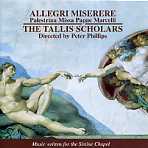We could spend a lot of time discussing comparisons between the Tallis Scholars’ original, now-classic 1980 recording of the Allegri Miserere and Palestrina Missa Papae Marcelli (not to mention the group’s landmark 1994 performances in Rome at the Santa Maria Maggiore), or we could get to the point–that these are distinctly different renditions, both in terms of recording perspective and interpretation, performances that stand on their own artistically and in the context of the development of early music scholarship. Most importantly, if you want to hear Palestrina sung by a choir that can claim unrivalled authority in the repertoire, look no further than the Tallis Scholars’ catalog, and especially regarding the well-loved and oft-recorded Missa Papae Marcelli. And as for the Allegri–what choir can boast more than 300 performances of this legendary piece, most with the same soprano, Deborah Roberts, so effortlessly and accurately tossing off all of those high-Cs?
I have to admit that I was present for the Tallis Scholars’ performances in Rome commemorating the 400th anniversary of Palestrina’s death, and I only bring this up to emphasize that it wasn’t for no reason that this choir was chosen to highlight such an important event: with its long experience interpreting sacred Renaissance music, especially Palestrina’s, this unquestionably was the ensemble that most clearly and expertly could convey the composer’s style and his music’s substantial, profoundly spiritual aspects.
This new recording, made in the same Merton College venue as those 1980 sessions, offers a decidedly closer perspective, allowing a degree of prominence to individual voices and making the ensemble seem smaller and less “blended”. The presence of the voices is at once more immediate than before, but it’s also more demanding of the listener–that is, more “edge of the seat” than “sit back and relax”. Tempos vary from slower in the Miserere to faster in parts of the Mass–an effect most notable in the Agnus Dei, where the slower 1980 version packs so much more emotional punch. Having lived with both versions of the Miserere and Missa for a long time, I find the earlier, more distantly-recorded, less fussily-detailed performances to be more satisfying. But having said that, if you don’t have the earlier version handy for comparison, you quickly accept the close-up sound of the new recording, whose immediacy and clarity lend an excitement you don’t experience from the earlier effort.
And then there’s the second performance of the Allegri that concludes this new program, featuring Deborah Roberts’ own embellishments (which are painstakingly reproduced in the liner notes), devised during years of experience performing the work. This is the sort of thing that recordings are made for, and the result is not only eminently satisfying but continues a tradition that dates back to Mozart’s precocious transcription of the piece from memory after one hearing. Aficionados of the Allegri also will notice a change in the chant interludes: instead of the traditional “Tone 2” chant, in this new version cantor Andrew Carwood decided to intone the “Tonus Peregrinus”, as it was discovered to be parodied in the work’s high soprano choral part–an ingenious and very effective interpolation.
I never thought I’d say this, but I very much prefer the Tallis Scholars’ 1980 analog recording of the two big works, for its warmth and, yes, sensuality; but for today’s listeners, who may prefer a brighter, more up-front sound, this new recording will be immediately appealing. And the new Deborah Roberts Allegri embellishments are certainly worth hearing–and will hold up to repeated listening at least for the next couple of centuries, until the next re-interpreter comes along. [2/21/2007]
































